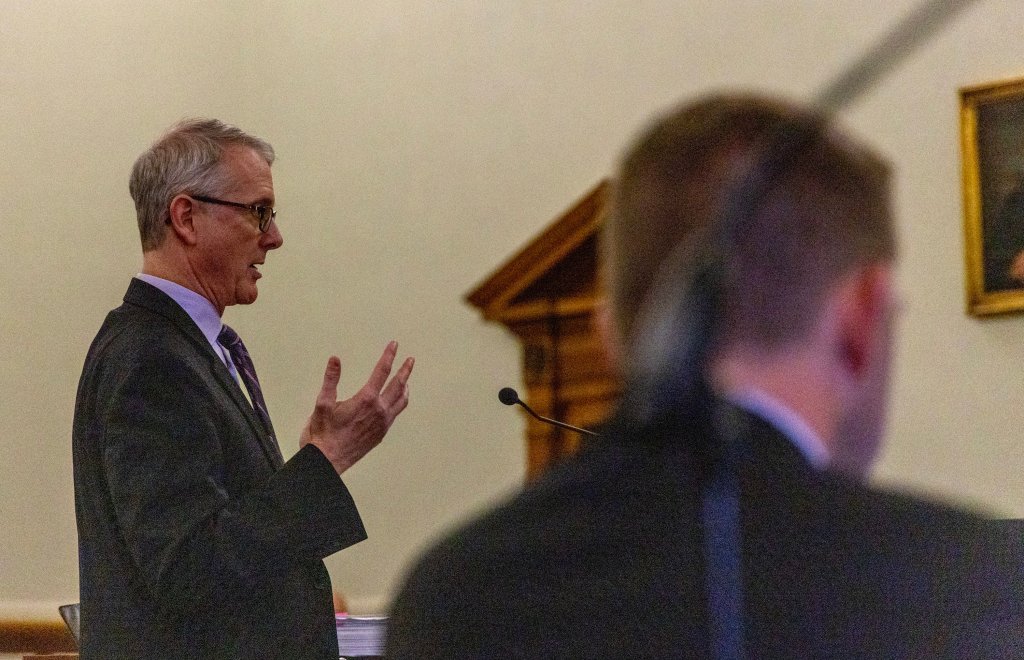
ROCKLAND — The state’s deputy chief medical examiner pushed back on the idea that CPR could have caused the death of a toddler in Knox County last year.
Dr. Liam Funte said that a “significant amount of force” was used to cause the injuries that killed 22-month-old Quayshawn Wilson, who died on May 29, 2024, after his mother realized he was unresponsive in the back of their car. An autopsy by Funte revealed a major tear to Quayshawn’s liver and damage to his right kidney.
Aziayh Scott, the mother’s boyfriend at the time, is on trial this week for a manslaughter charge. Prosecutors have accused Scott, 24, of stomping on Quayshawn earlier that day. He has denied the allegations and his attorneys have suggested CPR caused the injuries.
Funte’s findings are central to the state’s case against Scott, whose attorneys challenged Funte’s credibility before the trial. Last week, the defense asked permission to question Funte about disciplinary action by the Maine State Board of Medical Licensure related to an OUI charge against Funte while he was on call in 2023.
Prosecutors said that issue was not relevant to Scott’s case, and Scott’s lawyer said the defense was not allowed to ask Funte about it in court. Instead, they focused on the way Funte performed the autopsy and documented evidence, accusing Funte of not taking the time to rule out every possible explanation for Quayshawn’s death.
INJURIES A ‘RED FLAG’
A child abuse pediatrician who reviewed Funte’s report, as well as pictures and videos of Quayshawn from the day he died, said they showed the toddler’s bruised stomach and torn liver, both well known “red flags” for nonaccidental injuries.
“You don’t bruise there easily,” Dr. Nicholas Miles, who works for Spurwink Center for Safe and Healthy Families, testified on Thursday. “It’s not a place that you see injury. It takes a lot of force.”
Funte spent almost an hour walking the jury through Quayshawn’s autopsy, which he performed the day after the child’s death.
Funte said he could not offer a specific action that would have led to Quayshawn’s injuries. But he said it likely was not CPR, after watching a video from a Thomaston police officer that documented some of the resuscitation efforts.
“I did not see any level of force in the video that would cause that injury,” Funte testified.
Dr. Erik Christensen, an expert for the defense and former medical examiner in Utah, testified on Friday that he wasn’t comfortable ruling out CPR as the cause of the liver injury but echoed that it would be unusual.
Christensen agreed with Funte that Quayshawn’s torn liver was his “most significant injury.”
“So, if this jury concludes that CPR did not cause the devastating liver injury, there’s no need to go further, is there?” Assistant Attorney General Leanne Robbin asked.
“If CPR does not explain these injuries, they would have had to happen from some other blunt force trauma, yes,” Christensen said.
Christensen testified for the defense that Funte did not explore and rule out all of the potential explanations for why Quayshawn became unresponsive.
Christensen said he reviewed some of the same tissue samples as Funte and saw potential signs of myocarditis — inflammation of the heart muscle, which can lead to cardiac arrest.
Funte testified on Thursday that “the presence or absence of myocarditis would not change my opinion on (the) cause of death.”
Defense attorney Christopher MacLean questioned why Funte ordered an X-ray of Quayshawn but didn’t document whether he noticed any injuries to the boy’s ribs.
Before ordering the X-ray, Funte testified, he noticed signs of rib fracturing that he said could have been from CPR, although he said it would have been rare.
Funte testified he only ordered the X-ray to check for any obvious injuries, like a bullet.
Both sides are expected to deliver closing arguments Monday.
Other evidence against Scott so far has included Quayshawn’s blood being found on a pillow case at the Owls Head apartment where the couple was staying, and a neighbor who says she watched Scott carrying a “knocked out” toddler to the car, several hours before the boy’s death.
